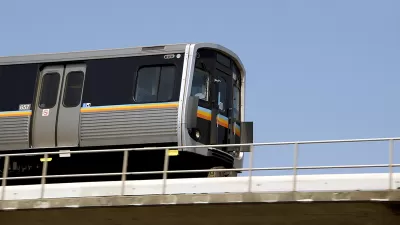In the aftermath of the disappointing defeat of a one-cent regional sales tax transportation measure, the city council is considering two measures to raise transportation revenue, one being a parking tax based on a Georgia Tech masters thesis.
Marshall Willis may have only dreamed when he began writing his masters thesis, "Structuring an Equitable Parking Tax" for the School of City and Regional Planning at the Georgia Institute of Technology that it would potentially become a policy-making document for the Atlanta City Council. Thanks to the voters' rejection of the 12-county, regional sales tax measure on July 31, 2012, this dream has been realized.
Thomas Wheatley writes that "Atlanta City Councilman Aaron Watson's office is studying the issue after he met a Georgia Tech student" whose thesis on parking taxes explained how it could be applied to Atlanta and how much revenue could be expected.
By conservative estimates, it could generate roughly $40 million per year — enough to put a sizable dent in Atlanta's more than $150 million sidewalk repair backlog. But according to the city's 2009 study on the issue, one plan could generate as much as $75 million each year. That cash could not only be used to start repairing the city, but also to attract additional federal funding for transportation.
The other revenue strategy under consideration, according to Wheatley, a bond measure that would need to go to the voters, appears unlikely.
In addition to raising revenue, the parking tax is a "user fee (that) follows conservative philosophy....could encourage transit ridership (and) help spur denser development". Plus, it would have two, less apparent benefits, writes Wheatley.
- (I)t's the closest the city will ever get to making non-Atlantans pay a commuter tax for the wear and tear they put on the city's roads every day.
- It could also teach Atlanta, with its super-cheap parking, the "The High Cost of Free Parking".
For the parking tax to become a reality, the Georgia General Assembly might "first need to give the city the authority to levy such a tax. If that happens (and that's a big if), City Hall officials would then have to decide whether to take the political risk and pursue the funding measure", writes Wheatley.
The last line of the abstract of Mr. Willis' thesis reads, "I conclude with the potential concerns of implementing such a tax and make a final recommendation for the City of Atlanta." He sets a high bar for future theses from the School of City and Regional Planning.
FULL STORY: Parking tax? Why not?

Manufactured Crisis: Losing the Nation’s Largest Source of Unsubsidized Affordable Housing
Manufactured housing communities have long been an affordable housing option for millions of people living in the U.S., but that affordability is disappearing rapidly. How did we get here?

Americans May Be Stuck — But Why?
Americans are moving a lot less than they once did, and that is a problem. While Yoni Applebaum, in his highly-publicized article Stuck, gets the reasons badly wrong, it's still important to ask: why are we moving so much less than before?

Using Old Oil and Gas Wells for Green Energy Storage
Penn State researchers have found that repurposing abandoned oil and gas wells for geothermal-assisted compressed-air energy storage can boost efficiency, reduce environmental risks, and support clean energy and job transitions.

Updating LA’s Tree Rules Could Bring More Shade to Underserved Neighborhoods
A new USC study finds that relaxing Los Angeles’ outdated tree planting guidelines could significantly expand urban tree canopy and reduce shade disparities in lower-income neighborhoods, though infrastructure investments are also needed.

California's Canal Solar Projects Aim to Conserve Resources and Expand Clean Energy
California’s Project Nexus has begun generating electricity from solar panels installed over irrigation canals, with researchers and state agencies exploring statewide expansion to conserve water and boost clean energy production.

HHS Staff Cuts Gut Energy Assistance Program
The full staff of a federal program that distributes heating and cooling assistance for low-income families was laid off, jeopardizing the program’s operations.
Urban Design for Planners 1: Software Tools
This six-course series explores essential urban design concepts using open source software and equips planners with the tools they need to participate fully in the urban design process.
Planning for Universal Design
Learn the tools for implementing Universal Design in planning regulations.
Heyer Gruel & Associates PA
City of Moreno Valley
Institute for Housing and Urban Development Studies (IHS)
City of Grandview
Harvard GSD Executive Education
Salt Lake City
NYU Wagner Graduate School of Public Service
City of Cambridge, Maryland




























